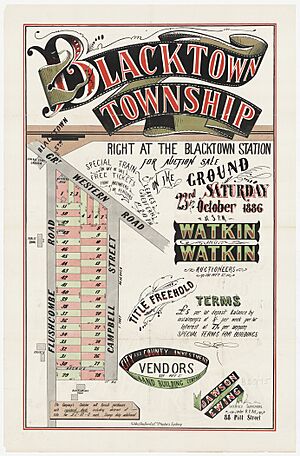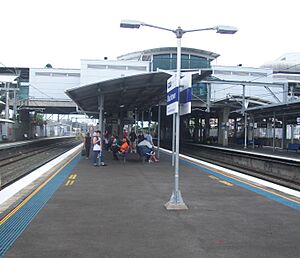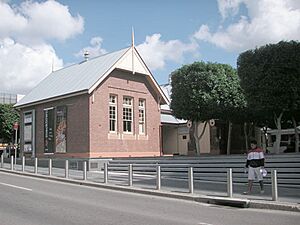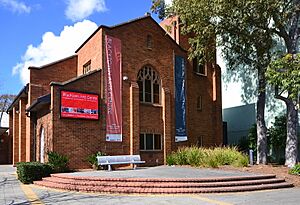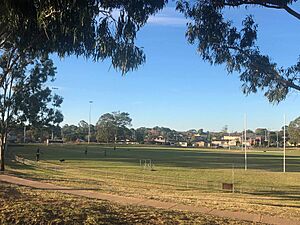Blacktown facts for kids
Quick facts for kids BlacktownSydney, New South Wales |
|||||||||||||||
|---|---|---|---|---|---|---|---|---|---|---|---|---|---|---|---|
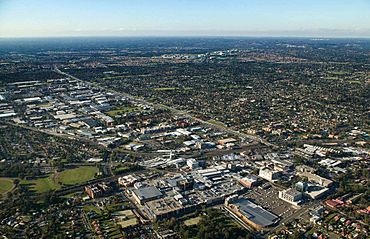
Aerial view of Blacktown looking northeast
|
|||||||||||||||
| Population | 50,961 (2021 census) | ||||||||||||||
| Established | 1821 | ||||||||||||||
| Postcode(s) | 2148 | ||||||||||||||
| Elevation | 70 m (230 ft) | ||||||||||||||
| Location | 34 km (21 mi) west of Sydney CBD | ||||||||||||||
| LGA(s) | City of Blacktown | ||||||||||||||
| State electorate(s) |
|
||||||||||||||
| Federal Division(s) | |||||||||||||||
|
|||||||||||||||
Blacktown is a suburb located in Sydney, Australia. It is part of the City of Blacktown local government area in New South Wales. Blacktown is about 34 kilometers (21 miles) west of the Sydney city center. It is known for being one of the most multicultural places in Greater Sydney. People from many different countries live here.
Contents
Discovering Blacktown's Past
Before 1788, the Darug people lived in the Blacktown area. Different groups, like the Warmuli and Gomerigal, called this land home. When the First Fleet arrived in 1788, many Darug people sadly died from new diseases like smallpox.
In 1791, Governor Arthur Phillip started giving land to European settlers. Later, in 1819, Governor Lachlan Macquarie gave land to two Indigenous men, Colebee and Nurragingy. This was to thank them for helping build a road over the Blue Mountains.
How Blacktown Got Its Name
In 1823, a school for Aboriginal children called the Native Institution moved to this area. It was located where Richmond Road meets Rooty Hill Road North today. This place became known as "The Blacks Town." The school was also called the Black Town Native Institute.
Even after the school closed in 1833, the road leading to it was still called the Black Town Road. In 1860, the railway station built nearby was named Black Town Road Station. By 1862, the name was shortened to Blacktown.
Growth of a Modern Town
The railway helped Blacktown grow into a town. A post office opened in 1862, and a school started in 1877. In 1906, the Shire of Blacktown was formed. Electricity came to the town in 1930. By 1933, about 13,000 people lived there.
In the 1950s and 1960s, many new homes were built. This led to more services in the town center. A hospital opened in 1965, followed by a courthouse and police station in 1966. A library opened in 1967, and a TAFE college in 1969. The Westpoint shopping center opened in 1973, bringing more shops and a cinema.
Today, Blacktown remains a very diverse suburb. People from over 130 countries call it home.
Blacktown's Weather and Climate
Blacktown has a humid subtropical climate. This means it has warm, somewhat rainy summers and cool, drier winters. It rains throughout the year. Blacktown has bigger temperature changes between summer and winter than places closer to the coast. It also gets less rain.
Summer Weather
Summers are warm and humid. The average temperature is similar to coastal areas, but the daily temperature changes more. This is because cool sea breezes from the Tasman Sea don't reach Blacktown. Blacktown also has more days over 30 °C (86 °F) than coastal Sydney. The hottest recorded temperature was 41.7 °C (107.1 °F) in December 1965.
Winter Weather
Winters are cool and fairly dry. Blacktown is further inland, so it has more nights below 5 °C (41 °F). It also has some nights below 0 °C (32 °F), which can cause light frosts. Strong southwesterly winds can affect Blacktown in winter. However, they lose most of their moisture over the mountains, making winter the driest season. The coldest recorded temperature was –3.9 °C (25.0 °F) in July 1970.
| Climate data for Blacktown, New South Wales, Australia (1955–1975 normals, extremes 1965–1975) | |||||||||||||
|---|---|---|---|---|---|---|---|---|---|---|---|---|---|
| Month | Jan | Feb | Mar | Apr | May | Jun | Jul | Aug | Sep | Oct | Nov | Dec | Year |
| Record high °C (°F) | 41.4 (106.5) |
41.1 (106.0) |
40.0 (104.0) |
33.6 (92.5) |
28.3 (82.9) |
24.0 (75.2) |
25.8 (78.4) |
27.8 (82.0) |
35.0 (95.0) |
36.6 (97.9) |
39.0 (102.2) |
41.7 (107.1) |
41.7 (107.1) |
| Mean daily maximum °C (°F) | 28.3 (82.9) |
27.7 (81.9) |
27.0 (80.6) |
24.1 (75.4) |
20.0 (68.0) |
17.5 (63.5) |
17.4 (63.3) |
18.6 (65.5) |
21.4 (70.5) |
23.8 (74.8) |
26.3 (79.3) |
28.4 (83.1) |
23.4 (74.1) |
| Mean daily minimum °C (°F) | 16.7 (62.1) |
17.0 (62.6) |
15.7 (60.3) |
12.3 (54.1) |
8.3 (46.9) |
6.3 (43.3) |
4.5 (40.1) |
5.9 (42.6) |
7.9 (46.2) |
11.0 (51.8) |
12.9 (55.2) |
15.3 (59.5) |
11.2 (52.1) |
| Record low °C (°F) | 8.9 (48.0) |
8.3 (46.9) |
5.3 (41.5) |
4.4 (39.9) |
0.8 (33.4) |
−1.1 (30.0) |
−3.9 (25.0) |
−0.8 (30.6) |
0.3 (32.5) |
3.3 (37.9) |
6.1 (43.0) |
8.5 (47.3) |
−3.9 (25.0) |
| Average rainfall mm (inches) | 102.6 (4.04) |
117.9 (4.64) |
117.7 (4.63) |
73.1 (2.88) |
65.4 (2.57) |
79.9 (3.15) |
43.2 (1.70) |
54.4 (2.14) |
46.6 (1.83) |
70.2 (2.76) |
81.5 (3.21) |
73.0 (2.87) |
925.5 (36.42) |
| Average rainy days (≥ 1 mm) | 8.0 | 8.7 | 9.0 | 6.4 | 6.0 | 6.9 | 5.1 | 5.4 | 5.7 | 7.4 | 7.7 | 7.6 | 83.9 |
| Source: Australian Bureau of Meteorology | |||||||||||||
Shopping and Important Places
The main shopping and business area of Blacktown is near Blacktown railway station. Westpoint Blacktown is a very large shopping center. There are also many smaller shops, restaurants, and hotels nearby. Westpoint even has a TV studio for the Nine Network.
Here are some important places in Blacktown's city center:
- An Australian Catholic University campus
- The main office for the Blacktown City Council
- Blacktown Courthouse
- Blacktown Hospital
- Blacktown Workers Club
- Cucina Locale Revolving Restaurant (a restaurant that slowly spins!)
- Max Webber Library – the main library for Blacktown City Council
- Patrician Brothers' College Blacktown
- Nagle College Blacktown
A famous person named Frank Lowy had a small delicatessen shop in Main Street in the 1950s. He later became a very successful businessman.
Getting Around Blacktown
Most people in Blacktown travel to work by car (48.3%). Public transport is used by 7.9% of people. Trains are the most common public transport, used by 3.3%. Buses are used by 1.7%.
Blacktown railway station is a key transport hub. It is on the North Shore & Western Line and the Cumberland Line of the Sydney Trains network. There is a large bus station next to the train station. Another underground bus station is at the entrance to Westpoint. Blacktown is also the end point for the North-West T-way, a special bus route.
Different bus companies provide services around Blacktown:
- Busways covers areas to the north (like Rouse Hill and Castle Hill), west (like Mount Druitt and Plumpton), and south (like Prospect and Blacktown Hospital).
- CDC NSW provides services to eastern areas (like Macquarie Park and Parramatta).
Schools in Blacktown
The very first school in Blacktown opened in 1877. It was a brick building with gables. This old building is no longer a school. It is now used as a Visitor Information Centre. It is the oldest building left in the Blacktown city center and is considered a heritage site.
There are many government-run primary schools in Blacktown, including:
- Blacktown North Public School
- Blacktown South Public School
- Blacktown West Public School
- Lynwood Park Public School
- Marayong South Public School
- Shelley Public School
- Walters Road Public School
Public high schools include:
- Blacktown Boys High School
- Blacktown Girls High School
- Evans High School
- Mitchell High School
There is also the Coreen School, which helps older students with learning difficulties.
For Catholic education, there are two primary schools: St Michael's and St Patrick's. There are also two Catholic high schools: Nagle College for girls and Patrician Brothers' College Blacktown for boys. Tyndale Christian School is a private school that teaches students from kindergarten to year 12.
Blacktown Arts Centre
The Blacktown Arts Centre is located at 78 Flushcombe Road. It sits on one of the highest points in the Blacktown city center.
The building was first built in the 1950s as an Anglican church. In 1999, it stopped being a church. The Blacktown Council bought the building, planning to use it for a car park. But then, working with Arts NSW, they decided to turn it into an arts center.
The Blacktown Arts Centre opened in October 2002. In 2006, it had a big renovation and expansion. It reopened in April 2007 with new spaces for performances, bigger art galleries, and workshops.
Sports and Fun in Blacktown
Blacktown has many places for sports and recreation:
- Blacktown Stadium at Blacktown Olympic Park – it can hold 10,000 people.
- Fairfax Community Stadium – used by the NSWPL team Blacktown City Demons. It can hold 7,500 people.
- Blacktown Baseball Stadium – for baseball, it can hold 5,000 people.
- Blacktown Softball Stadium – for softball, it can hold 5,000 people.
- Blacktown Showground – used for festivals and cultural events.
- Village Green & Civic Centre – used for community events.
- PCYC Blacktown – a Police Citizens Youth Club.
- Blacktown Aquatic Center – for swimming.
- Blacktown Norwegian Ice Bathing Club.
- Bungarribee Park.
- Featherdale Wildlife Park – a great place to see Australian animals.
- Alpha Park.
- Blacktown Olympic Park.
- Grantham Reserve.
- Captain Tench Reserve.
Local News and Radio
Blacktown has its own local newspaper called Blacktown Advocate. There is also a community radio station, SWR Triple 9, that serves the area.
Who Lives in Blacktown?
Population Details
In 2021, there were 50,961 people living in Blacktown. About 43.6% of them were born in Australia. Many people come from other countries. The most common countries of birth were India (16.6%), the Philippines (5.5%), and China (2.4%).
English is spoken at home by 39.3% of people. Other languages spoken include Punjabi (10.2%), Hindi (4.4%), and Arabic (4.1%).
When it comes to religion, the most common choices were Catholic (21.7%), No Religion (16.8%), and Hinduism (14.5%). In 2021, the average age of people in Blacktown was 34 years old.
Famous People from Blacktown
Many talented people have come from Blacktown! Here are a few:
- Josh Addo-Carr – a rugby league player.
- Blake Austin – a rugby league player.
- Kurtley Beale – a rugby union player for Australia.
- Bob Brown – a former Australian Senator.
- Reagan Campbell-Gillard – a rugby league player.
- Toni Collette – a famous actress.
- Ben Creagh – a rugby league player.
- Damian Cudlin – a professional motorcycle racer.
- Brett Delaney – a rugby league player.
- Jake Doran – a cricketer.
- Joel Edgerton – an actor.
- Andrew Fifita – a rugby league player.
- David Fifita – a rugby league player.
- Mark Geyer – a rugby league player.
- Matt Geyer – a rugby league player.
- Wade Graham – a rugby league player.
- Timothy Hodge – a Paralympic swimmer.
- Calum Hood – the bassist for the band 5 Seconds of Summer.
- Hush – a glam rock band formed in 1971.
- Brad Izzard – a rugby league player.
- George Jennings – a rugby league player.
- Michael Jennings – a rugby league player.
- Robert Jennings – a rugby league player.
- Julian Karikalan – a filmmaker.
- Felix Lee – a member of the K-pop group Stray Kids.
- Frank Lowy – a leading Australian businessman and giver to charity.
- Feleti Mateo – a rugby league player.
- Taylan May – a rugby league player.
- Tyrone May – a rugby league player.
- Daniel Mookhey – the Treasurer of New South Wales.
- Matt Moylan – a rugby league player.
- Courtney Nevin – a soccer player for the Australia national team.
- Northlane – a metalcore band formed in 2009.
- Marlisa Punzalan – winner of The X Factor Australia.
- The Radiators – a pub rock band formed in 1978.
- Jarrod Sammut – a rugby league player.
- Gurinder Sandhu – an Australian cricketer.
- Colin Sieders – an Australian paracanoeist and former racing driver.
- Kyah Simon – a soccer player for the Australia national team.
- Will Skelton – a rugby union player for Australia.
- Thy Art Is Murder – a deathcore band formed in 2006.
- Mark Winterbottom – a V8 Supercar driver.
- Matthew Wright – a rugby league player.
Images for kids
See also
 In Spanish: Blacktown para niños
In Spanish: Blacktown para niños



